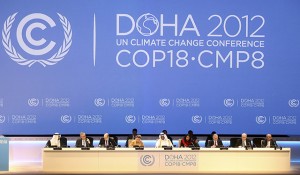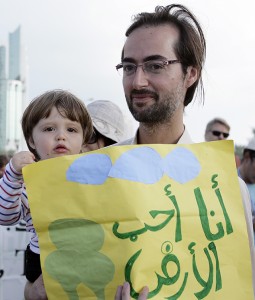Three years ago this month environmentalists and climate scientists were touting the “two degree target” — the agreed-upon end-of-the-century threshold for avoiding potentially “dangerous climate change.” The UN Climate Summit was happening in Copenhagen — the greenest city in Europe — and many had high hopes that world leaders would commit to reduce emissions in order to hit the target. But the final agreement worked out — chiefly between President Obama and Chinese Premier Wen Jiabao — contained no emissions reduction promises. The Copenhagen Accord acknowledged the scientific case for keeping global temperature rises under 2° Celsius (3.6°F), but failed to lay out a workable course of action for achieving the goal.

Organizers are seen on stage at the opening ceremony of the 18th United Nations climate change conference in Doha, Qatar, Monday, Nov. 26, 2012. U.N. talks on a new climate pact resumed Monday in oil and gas-rich Qatar, where negotiators from nearly 200 countries will discuss fighting global warming and helping poor nations adapt to it. (AP Photo/Osama Faisal)
In 2012 greenhouse-gas emissions reached 50 gigatons of carbon equivalent — 20% more than in 2000 and roughly 14% above where emissions need to be in 2020 to hit the 2°C target. If emissions are not cut, the UNEP reckons, they will reach 58 gigatons in 2020 — 14 gigatons more than they should be. This is a vast excess, equal to the total emissions today of America, Europe and Russia combined.
Although scientists and negotiators are still publicly aiming for the 2° target, it’s generally acknowledged that even if countries curb emissions based on that goal, it’s already too late to achieve it. Last year, Fatih Birol, the chief economist of the International Energy Agency declared the target a “nice Utopia.” The Guardian reports that just in the past few weeks “authorities including the World Bank and the International Energy Agency have warned that the world is heading for unprecedented [warming] – of between 4°C and 6°C – if current trends are not reversed.”
World Bank President Jim Yong Kim told The Washington Post that it’s a “doomsday scenario.” The Bank’s report, entitled “Turn Down the Heat,” urges “stepped-up efforts to meet world carbon-reduction goals after looking at what it says would be the catastrophic consequences” if temperatures rise more than 4°C (~7.3°F) by 2100. The report details what might happen.
The 4°C scenarios are devastating: the inundation of coastal cities; increasing risks for food production potentially leading to higher malnutrition rates; many dry regions becoming dryer, wet regions wetter; unprecedented heat waves in many regions, especially in the tropics; substantially exacerbated water scarcity in many regions; increased frequency of high-intensity tropical cyclones; and irreversible loss of biodiversity, including coral reef systems.

A man with his son holding a banner reading 'I love the earth' as they march with local and international activists to demand urgent action to address climate change at the U.N. climate talks in Doha, Qatar, Saturday , Dec. 1, 2012. (AP Photo/Osama Faisal)
After failures in Cancun and Durban, this year’s Doha summit amounts to what The Economist characterizes as “talks about talks.” The U.S. remains a noncommittal bystander in the negotiations, and no one expects significant progress will be made there. One can only hope that recent extreme weather, such as Hurricanes Isaac and Sandy, and the summer’s record droughts and resulting wildfires will put an end to the debate about what causes climate change in this country, and finally begin a real conversation on how to stop it.

